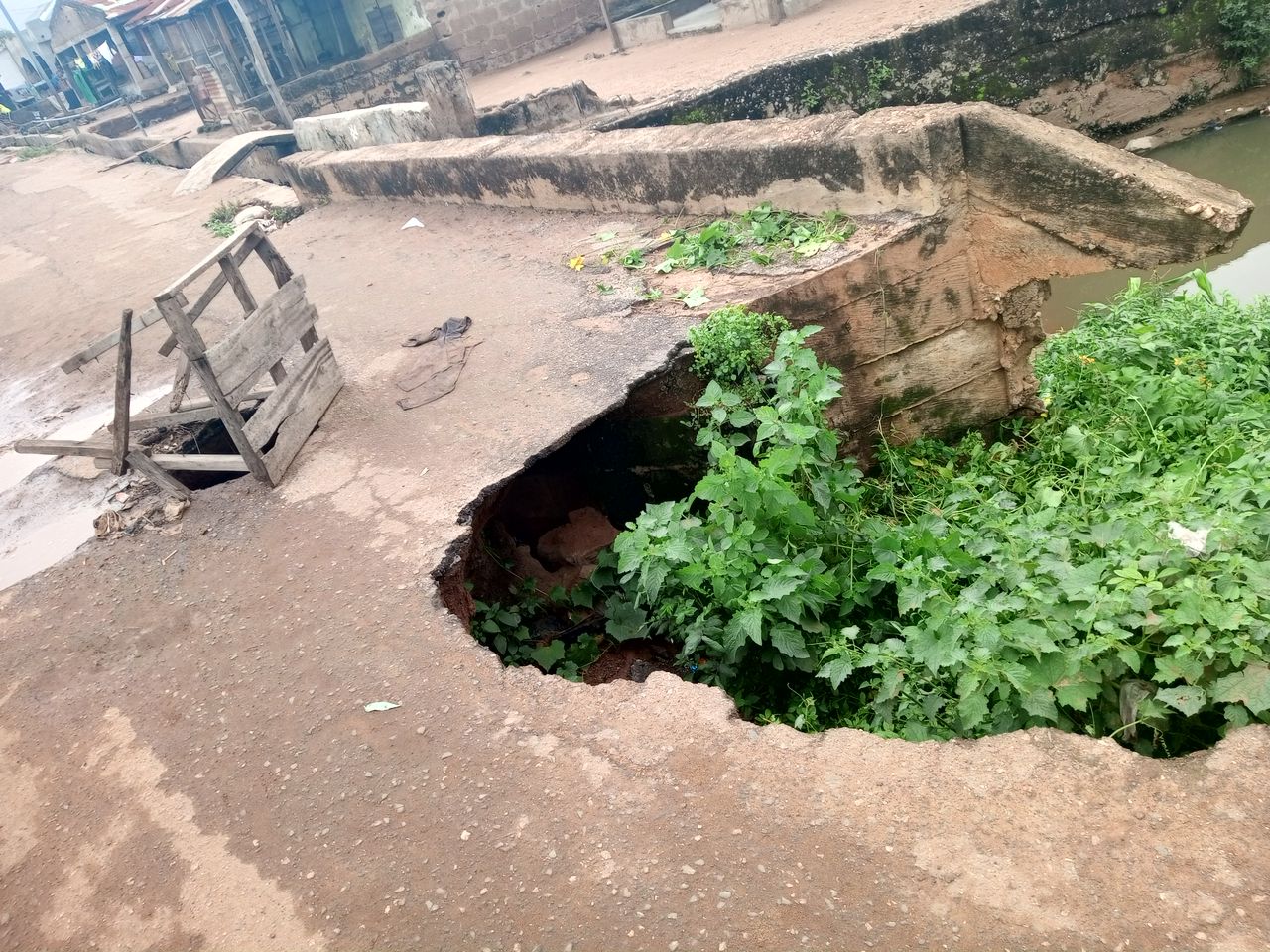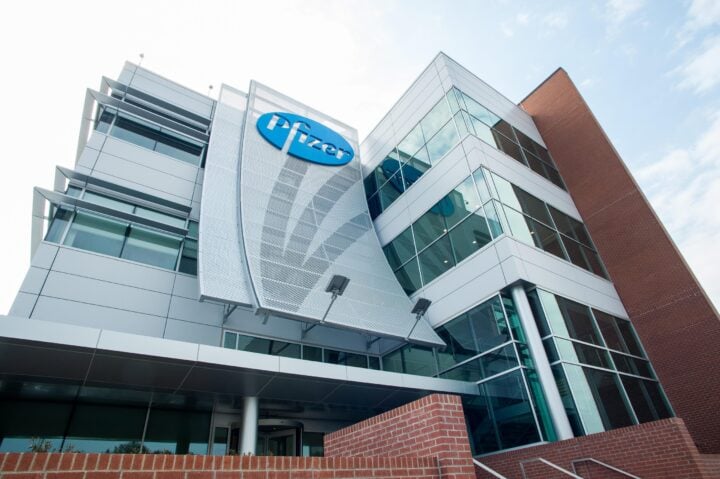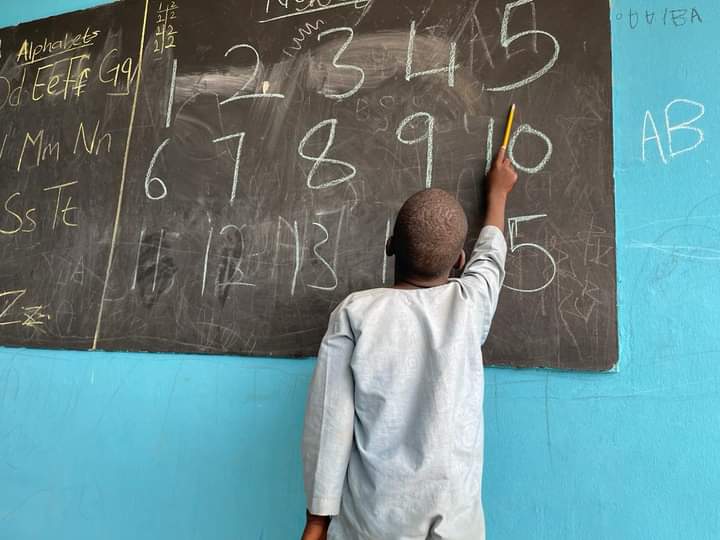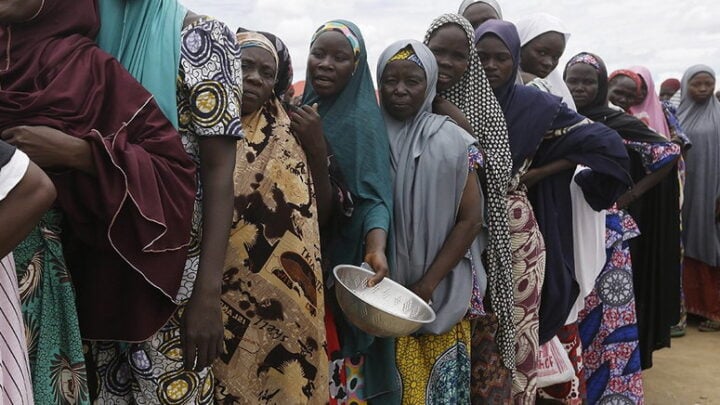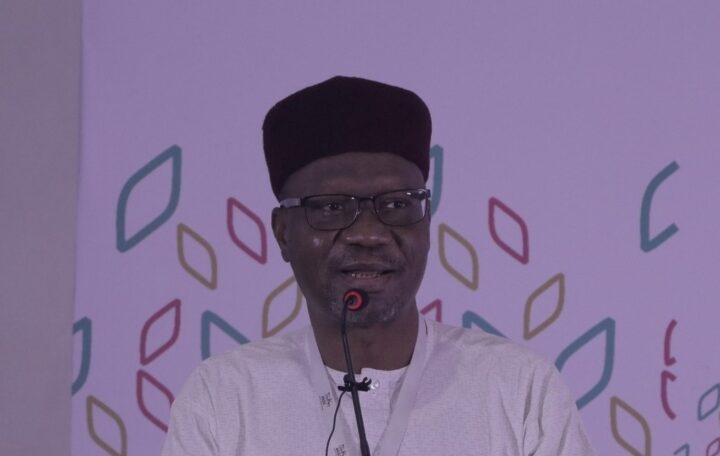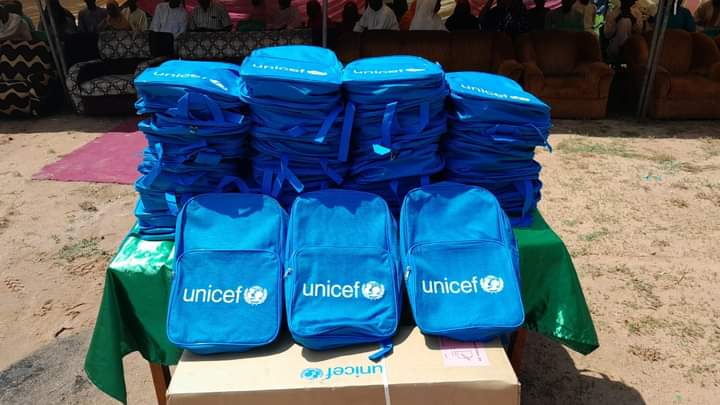Photo Credit: UNICEF
The hustling and bustling of children clustered around the Iyana-Ipaja market in Lagos state drew the attention of passersby. Many of them, aged six and above, were seen either hawking or glued to their mothers, begging for alms.
Nafisatu Abubakar, barely eight years old, had followed Aishatu, her 56-year-old mother from Jigawa state to beg for alms in Iyana-Ipaja.
“My daughter doesn’t go to school,” Aishatu said in her local Hausa language.
“I have no means of sending her to school; that’s why she has never been enrolled in school.”
Advertisement
Nafisatu is not alone. Many of the children in the market said they have never been to school. They just grew up seeing their parents hawk, beg or do menial jobs on the streets of Lagos.
“We left our home in the north to look for what to eat in Lagos,” Aishatu said.
Salamatu, who is Nafisatu’s younger sister, also appeared not to have any hope of being enrolled in a school.
Advertisement
Globally, children are entitled to free and quality basic education, yet the number of out-of-school children in the world is alarming and on the rise. The rise is particularly evident in sub-Saharan Africa with Nigeria as the epicenter.
According to the World Bank, Nigeria, in 2020, had more than 11 million out-of-school children between the ages of 6 and 15. This figure represents 1 in 12 of all out-of-school children globally and 22 per cent of all children in the age group in Nigeria.
Out-of-school children in Nigeria, according to the Universal Basic Education Commission (UBEC), include girl-child in northern Nigeria, boy-child dropouts in the south-south and south-east regions, internally displaced children and the almajiri Qur’anic and itinerant children who are predominantly found in northern part of the country.
THE PERSISTENT PROBLEM
Advertisement
In 2020, the federal government said it committed N220 billion, a credit facility from the World Bank, to the Better Education Service Delivery for All (BEDSA) in 17 states of the federation. The cardinal objective of the BEDSA programme, according to officials, is to “increase equitable access for out-of-school children, improve literacy and strengthen accountability at the basic education level.”
The BEDSA programme has been around since 2018 and has reportedly facilitated the enrolment of one million out-of-school children.
Also, UBEC introduced the Open School Programme (OSP) in 2020 to mop-up out-of-school children with the flagship in six states in Nigeria. Hameed Bobboyi, executive secretary of the commission had described OSP as a “flexible education system that allows learners to learn where they are and when they want, away from conventional schools and teachers.”
Despite these programmes and strategies deployed by the federal government to address the menace of out-of-school children, the number has continued to increase.
Advertisement
Chukwuemeka Nwajiuba, former minister of education for state, at the launching of BEDSA programme in Dutse had warned that “unless and until our efforts at enrolling these children outweigh the birth rate, the challenge would continue to stare us in the face.”
As of October 2022, almost two years later, about 20 million children are out of school in Nigeria, according to the United Nations Educational, Scientific and Cultural Organisation (UNESCO). This figure is a far-reaching increase from the 10.5 million recorded by the United Nations Children’s Fund (UNICEF) in 2020. In fact, the World Bank posits that Nigeria is experiencing learning poverty in which 70 per cent of 10-year-olds cannot understand a simple sentence or perform basic numeracy tasks.
Advertisement
THE ALTERNATIVE SCHOOL PROGRAMME
The latest attempt to address the menace of out-of-school children came in January 2021 when President Muhammadu Buhari inaugurated an 18-member presidential steering committee on the Alternate School Programme (ASP). The initiative was co-chaired by Adamu Adamu, the minister of education, and Sadiya Umar Farouq, the minister of humanitarian affairs, disaster management and social development.
Advertisement
During its commencement in February, Buhari said the programme will target delivering a limited scope of subjects — Mathematics, English Language, Basic Sciences and Social Studies — to children with limited access.
In April 2021, the federal government announced the expansion of membership of the national steering committee of the alternative school programme to include eight more personnel from relevant ministries and forums in the country.
Advertisement
In an interview, Farouq said the ASP is different from other intervention initiatives because it combines education programmes with social protection programmes. The development, she said, targets the humanitarian and social challenges of out-of-school children and would provide them with education and social investment benefits in a flexible way.
She further said the target benefactors include those in internally displaced persons (IDP) camps, those in vulnerable conditions, victims of insurgency and social and environmental dislocation, and children on the streets and in markets. A technical working group (TWG) with members drawn across government ministries, international organisations and civil society organisations were expected to go into the field to document and organise these children for systematic intervention.
The national steering committee, in October 2021, considered and adopted a work plan presented by the TWG, to ensure a hitch-free administration of the ASP.
The work plan according to Farouq “is expected to help reduce illiteracy as well as the number of out-of-school children in the country”.
Faruq had earlier mentioned at a media briefing in February that “We are going to take the schools, teaching and learning to the places where these children are; be it in the sangaya setting, or in workshops where children are being used or in the shops where we have this kind of children.”
THE NEED FOR MONITORING AND EVALUATION
Gideon Olanrewaju, an educational development practitioner and founder of AreaiAfrica, however, said it’s important that measurable lenses are put around how the programme is being implemented.
“I fear that owing to the lackadaisical attitude to which they (the government) are going about the coordination of the programme right now, there’s every tendency that monitoring and evaluation (M&E) is actually extremely poor,” Olanrewaju said.
There has been the question of whether the ASP is sustainable in the face of the series of institutional bottlenecks facing Nigeria as noted by the World Bank in the June 2022 Nigerian Development Update. The bottlenecks, aside from the supply and demand-side constraints, include weak capacity for planning, implementation, monitoring and evaluation, inadequate accountability due to overlapping roles and responsibilities, the politicisation of teacher management and lack of commitment to addressing inadequate, inefficient and inequitable financing.
There are also numerous attacks on schools by jihadists and criminal gangs which forced the authorities to close more than 11,000 schools since December 2020. The attacks created a hostile learning environment which discouraged parents and guardians in the affected localities from sending their wards to school — formal or alternative. Also, children account for about 60 per cent of the IDPs in Nigeria, the majority of whom lack access to education and healthcare among other basic amenities.
BUT A SIMILAR PROGRAMME IS WORKING IN SUDAN
In Sudan, a broader programme, Alternate Learning Programme (ALP), is being implemented alongside other initiatives to tackle the out-of-school children menace and generally improve education in the post-war economy, with support from UNICEF. The country is the epicentre of out-of-school children in the Middle East and North Africa region.
ALP was best described by UNICEF as an alternative venue of learning for children and adolescents who missed the opportunity to join school or have left the official school system at some point, and this includes children affected by emergencies and conflict. This description fits the acclaimed purposes of ASP in Nigeria.
ALP in Sudan mixes formal and alternative non-formal education approaches that address a combination of demand and supply factors affecting access to primary education. Localities have been selected, mainly in states with enrolment rates below the national enrolment rate level, based on pre-defined criteria such as the availability of school infrastructure, the support provided by other partners, and community involvement.
Like in Nigeria, ALP in Sudan specifically targets vulnerable populations, including girls, nomadic populations, children with special needs, and children affected by emergency situations.
Neighbourhoods and camps in Sudan like Al Shaer, Kadulgi which is home to many displaced families from war-torn states, refugees and IDPs have ALP specifically tailored to support girls and boys who have never attended school, have dropped out or those who cannot be mainstreamed into the normal education system without catching-up on the lessons that they lost.
At Al Shaer School, a six-month intensive course approach is applied, and most of the students are integrated into the official school system afterwards.
According to Nasr Al-Deen Mohamed Tia, the head of the combating illiteracy and adult, children and youth out-of-school education at the ministry of education in South Kordofan state, Sudan, the six-month course bridges the gap between the children who have spent two or even four years out of school and the official school system they are transitioning into.
In Alshuahad, Kassala state, Eastern Sudan, out-of-school children are usually enrolled in alternative learning programmes though with limited possibility to be transferred to formal schools. Some children in ALPs in Kassala graduated and passed the primary exam in 2019. Several other neighbourhoods in Sudan have benefited from the ALP.
Alshuahad and Al Shaer are just two of the many neighbourhoods in Sudan whose children are benefiting from ALP as there are 961 centres across the country. The enrolled children were supported with the provision of learning supplies, textbooks, recreation kits, school uniforms and dignity kits for girls, improvement of the learning environment and facilitators training.
UNICEF Sudan education report in 2021 shows that 59,046 out-of-school children have access to education in the country through the ALP. Also, an assessment of the ALP centres in Kadugli conducted by UNICEF in 2021 reveals that ALP can provide a second chance for learning for children and adolescents who missed the opportunity for an education.
ASP CAN WORK IN NIGERIA TOO, BUT…
Analysing the programme, Olanrewaju further explained that the ASP is indeed sustainable in Nigeria because it is not the first educational programme in Africa that has social protection component and is focused on disadvantaged populations.
According to him, there’s a growing body of evidence that these interventions recorded success across Africa in countries like Liberia, Sierra Leone, Ethiopia, and Kenya, which seems to share the same socio-political clime and demographics with Nigeria.
He, however, raised concerns about the qualitative and not quantitative measurement of the impact delivery of such programmes.
“Many times in Nigeria, the success of programmes have been measured by virtue of the volume; how much have we done, how many have we reached, and sometimes those numbers are always been inflated for the purpose of public relations (PR) and self-aggrandisement. But it is also very important that attention is being placed on how well this programme transforms life and enables the children that are being engaged, to really live to their fullest potentials,” he said.
Olanrewaju said that with the kind of input that goes into a programme like ASP, an outcome-based strategy should be developed around it. He said continuity should be heavily dependent on the results that are obtainable through the channels of implementation whether at the federal level or the regional level both in the current and coming administrations.
He also added that the government would have to ensure fiscal transparency and accountability in resources allocated to the programme as well as an adequate monitoring and evaluation system.
At the time of filing this report, efforts to get comments from the ministry of education and the ministry of humanitarian affairs, disaster management and social development on the implementation strategies of the ASP proved abortive.
As Olanrewaju advised, if properly implemented, evaluated and sustained, the ASP has the potential to reach Nafisatu, Salamatu and other children like them with alternative learning empowerment opportunities that enable them to live to their fullest potential.
The report was sponsored by I-79 Media Consults’ Campus Solutions project which is supported by the Solutions Journalism Network (SJN) as part of the 2022 LEDE Fellowship.

